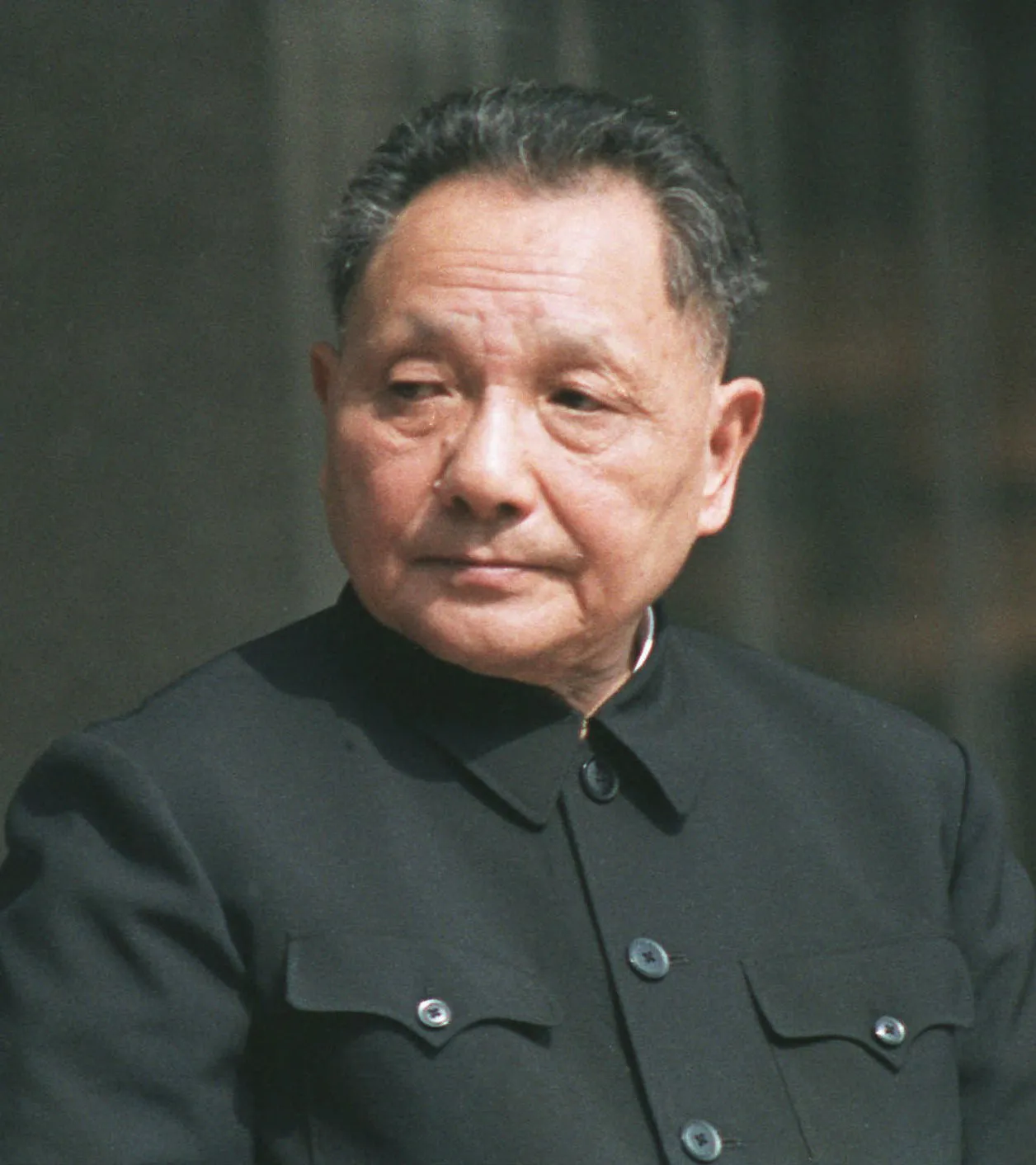No matter to what degree China opens up to the outside world and admits foreign capital, its relative magnitude will be small and it can't affect our system of socialist public ownership of the means of production.
Deng Xiaoping
"The principle of upholding the socialist path. The principle of upholding the people's democratic dictatorship. The principle of upholding the leadership of the Communist Party of China (CPC) The principle of upholding Mao Zedong Thought and Marxism–Leninism"
- 4 Cardinal Principles formulate by Deng Xiaoping
Deng Xiaoping, Han nationality (Hakka), was born Deng Xixian in 1904 in Guang'an county, Sichuan province. He went to France in 1920, where he worked, studied, discovered Marxism-Leninism, and joined the CPC in 1924. Deng spent part of 1926 studying at the Sun Yat-sen University in Moscow, before returning to China in 1927.
Deng then joined the Red Army during the first civil war against the Guomindang. During the Long March in 1934, he served as General Secretary of the CPC Central Committee. In the late 1930s and 1940s, Deng continued his political work in the Red Army during the War of Resistance against Japan and the second civil war against the Guomindang.
Deng was named to several important posts in the new People's Republic after 1949. In 1957, Deng became CPC General Secretary and ran the country's daily affairs with then President Liu Shaoqi. Amid growing disenchantment with Mao's Great Leap Forward, Deng and Liu gained influence within the CPC when, in the early 1960s, they directed successful economic reforms.
When Mao launched the Cultural Revolution in 1966, Deng was purged and sent to work in the countryside. Premier Zhou Enlai was able to convince Mao to bring Deng Xiaoping back into politics in 1974 as First Deputy Premier, in practice running daily affairs. But after Zhou's death in January 1976, Maoists purged Deng once again.
Following Mao's death later in 1976, Deng was able to outmaneuver Mao's anointed successor, Hua Guofeng, and consolidate his control of the CPC in the late 1970s. Hua was replaced by Zhao Ziyang as premier in 1980, and by Hu Yaobang as CPC chief in 1981. After 1987 Deng's only official posts were as chairman of the PRC and CPC Central Military Commissions.
Even while consolidating his political power, Deng initiated a "reform and opening" policy that sparked an industrial revolution in China. Deng decentralized economic decision making, embraced the "socialist market economy," and sought the "Four Modernizations" of agriculture, industry, science and technology, and the military. These reforms were a reversal of the Maoist policy of economic self-reliance, but they accelerated the modernization process through "opening" to foreign trade and investment. Special Economic Zones were established where foreign investment and market liberalization were encouraged.
Deng developed the principle that in foreign affairs, China should keep a low-profile and bide its time. He continued to seek an independent position between the United States and the Soviet Union. On 1 January 1979, the United States recognized the People's Republic of China, leaving the (Taiwan) Republic of China's nationalist government to one side, and business contacts between China and the West began to grow.
From 1980 onwards, Deng led the expansion of the economy, and in political terms took over negotiations with the United Kingdom to return Hong Kong, meeting personally with then-Prime Minister Margaret Thatcher. The result of these negotiations was the Sino-British Joint Declaration, signed on 19 December 1984, which formally outlined the United Kingdom's return of the whole Hong Kong colony to China by 1997.
In 1989, Deng ordered the crackdown on the Beijing Spring protestors, precipitating the Tiananmen Square crisis of June 4, 1989. To reassert his economic agenda, in the spring of 1992, Deng made a tour of southern China, visiting Guangzhou, Shenzhen, Zhuhai and spending the New Year in Shanghai, using his travels as a method of reasserting his economic policy after his retirement from office. Deng's health deteriorated drastically since 1994
Deng Xiaoping died on February 19, 1997.
Megathreads and spaces to hang out:
- 📀 Come listen to music and Watch movies with your fellow Hexbears nerd, in Cy.tube
- 🔥 Read and talk about a current topics in the News Megathread
- ⚔ Come talk in the New Weekly PoC thread
- ✨ Talk with fellow Trans comrades in the New Weekly Trans thread
- 👊 Share your gains and goals with your comrades in the New Weekly Improvement thread
reminders:
- 💚 You nerds can join specific comms to see posts about all sorts of topics
- 💙 Hexbear’s algorithm prioritizes comments over upbears
- 💜 Sorting by new you nerd
- 🌈 If you ever want to make your own megathread, you can reserve a spot here nerd
- 🐶 Join the unofficial Hexbear-adjacent Mastodon instance toots.matapacos.dog
Links To Resources (Aid and Theory):
Aid:
Theory:

People in their 20’s are incredibly age conscious. I keep hearing people in that age group complaining the most about how old they are and how much aging sucks.
Makes me feel like a fossil compared to them if they think 24 is old.
I somewhat agree with this but also I have seen many people in their 20s lately with health issues usually seen in your 40s.
Getting old sucks and the only constant is how every person older than you talks shit about how not old you are
Like sorry 33 isn't as ancient as you, grandpa (not @[email protected] like a general fictitious grandpa) but it still sucks getting weird lumps in your body or your calves just deciding to literally blow up from running like, a mile, or you suddenly get psoriasis or your back or knees or legs just hurt all the fucking time
And as a millennial it especially annoys to hear because these older people have generally had fucking healthcare all their lives, I haven't seen a doctor in 7 years outside of when i cut my thumb at work. I'm literally self diagnosing and treating that aforementioned psoriasis (while getting bombarded with tv ads for oral medications I can't just go buy because despite knowing it's fucking psoriasis woops I don't have a medical degree. Whatever) but yeah sure I'm so young and healthy
I tried to give a new coworker some advice yesterday because he was complaining about lower back pain, I just wanted to tell him that stretching the shit out of my hamstrings was the magic fix for my lower back pain, but I'm like "do you stretch your hamstrings, like, ever" and my sous chef made fun of how accusatory that sounded and the new guy was all "blah blah blah I'm just old and fat" like that was the reason I said that. When I just wanted to bring it up because unstretched hamstrings = lower back pain isn't really intuitive!
I guess tbh people in my department (state) don’t live long with the average age being 21. Rare to find anyone over 50 out here.
But yeah it is pretty frustrating to face issues and someone older responds by saying it’s not a big deal because you’re younger and therefore healthier.
Really hope your situation improves. Sounds pretty bad.
Nah Im pretty alright unless I have undiagnosed cancer or the weird headache from coughing I rarely get actually is a cerebrospinal fluid leak
I mean I can row 2.5 milesc in 15 minutes Im a machine
but thank you though